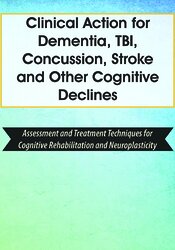

The treatment landscape for dementia and brain related cognitive interventions is rapidly changing, making it difficult to stay abreast of treatments that work and those that have been over-hyped. With the popular understanding of brain plasticity increasing while concussion-related conditions are gaining a wealth of media focus, patients are looking to you to help them separate fact from fiction about brain health and rehabilitation.
Using the latest science, Dr. All will teach you practical interventions to best help your clients build and maintain cognitive skills and functional independence. You will leave this recording with a comprehensive toolbox of evidence-based cognitive rehabilitation interventions and the skills you need to match them to the cognitive domains for which they are most effective.
Drawing on over 15 years of clinical experience, Dr. All will teach you techniques and interventions to effectively:
Walk away with practical and useful techniques that can be implemented immediately within your practice. Start feeling confident in delivering the rehabilitation interventions your clients facing cognitive decline so desperately need!
This online program is worth 6.25 hours CPD.
| File type | File name | Number of pages | |
|---|---|---|---|
| Manual - Clinical Action (7.72 MB) | 99 Pages | Available after Purchase |

Sherrie All, PhD, is a licensed clinical neuropsychologist who has specialized in treating people with dementia, Parkinson’s disease, TBI, MS, and other neurological disorders for over a decade. Dr. All is the founder and director of the Chicago Center for Cognitive Wellness, a private neuropsychology practice specializing in cognitive rehabilitation and brain health. The evidence-based cognitive rehabilitation interventions she uses have helped hundreds of adults experiencing cognitive declines improve their thinking skills, expand their functional independence, and enhance their brain health. Dr. All has worked as a consultant to the Mather LifeWays Institute on Aging, helping to develop and evaluate a holistic brain fitness program, and her work with individuals on ways to lower their personal risk for dementia has earned the attention of media outlets including The New Yorker and Crain’s Chicago Business. Dr. All earned her PhD in clinical psychology from Rosalind Franklin University of Medicine and Science, is a member of the American Psychological Association and author of The Neuroscience of Memory: Seven Skills to Optimize Your Brain Power, Improve Memory and Stay Sharp at Any Age.
Speaker Disclosures:
Financial: Sherrie All is the owner of Chicago Center for Cognitive Wellness. She receives royalties as a published author. Sherrie All receives a speaking honorarium and recording royalties from PESI, Inc. She has no relevant financial relationships with ineligible organizations.
Non-Financial: Sherrie All is a member of the American Psychological Association. the Illinois Psychological Association, and the International Neuropsychological Society.
THE COGNITIVE DECLINE TOOLBOX: REAL WORLD TREATMENT STRATEGIES FOR EACH COGNITIVE DOMAIN
ATTENTION & WORKING MEMORY
MEMORY: PROSPECTIVE, ENCODING & RECALL
EXECUTIVE FUNCTION
VISUOSPATIAL & LANGUAGE
HOLISTIC BRAIN HEALTH INTERVENTIONS
RESEARCH, LIMITATIONS AND RISKS
| 5 |
|
| 4 |
|
| 3 |
|
| 2 |
|
| 1 |
|
Satisfaction Guarantee
Your satisfaction is our goal and our guarantee. Concerns should be addressed to info@pesi.co.uk or call 01235847393.
Please wait ...